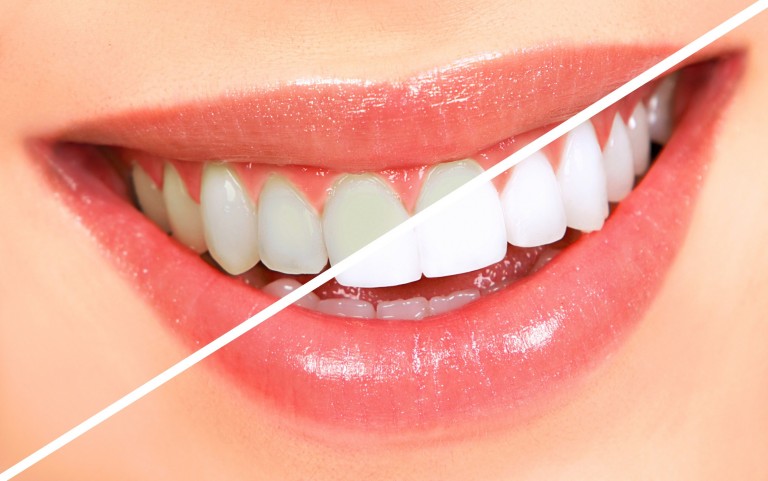
It’s no secret that modern society places a great deal of value on having white teeth, which are often seen as status symbols and indicators of good health.
Besides the routine visits to the dentist, a great deal of attention and money is spent on teeth-whitening remedies, however, this comes with a huge personal cost.
Fortunately, there are several natural ways to whiten your teeth, most of which are proved by science.
In this article, we look at 5 ways to whiten your teeth through entirely natural methods.
1. Use a Combination of Baking Soda and Hydrogen Peroxide
Many people have reported success after using hydrogen peroxide on their teeth, confirming that it makes their teeth a few shades whiter.
Simply take a small amount of hydrogen peroxide and combine it with an equal amount of baking soda (sodium bicarbonate) to make a paste.
Dab your toothbrush on the paste and brush as usual, making sure to reach the hard-to-reach areas of your teeth and gum line.
Hydrogen peroxide not only whitens your teeth, it’s also an anti-bacterial substance that kills germs in your mouth and gums.
Baking soda, or sodium bicarbonate, has long been used as a natural teeth-whitening solution due to its mildly abrasive texture that gently scrubs the surface of teeth, restoring its white color.
Just be sure to use enough hydrogen peroxide to temper the abrasiveness of the baking soda and prevent it from scraping away the enamel from your teeth.
You want your paste to be runny rather than gritty.
2. Turn to Apple Cider Vinegar
Apple cider vinegar is yet another common kitchen ingredient (along with lemons and baking soda) with the ability to work as a mouth and gum cleaner, as well as stain remover—particularly stains caused by coffee and nicotine.
Although apple cider vinegar has been proven to work as a teeth whitener, the results don’t usually show until after a month of continuous use.
Some people have remarked that the results of using ACV seem to be as good as having your teeth cleaned by a dentist!
Just remember though, that as with any acidic substance, too much of ACV can scrape away your tooth enamel.
After brushing with ACV, be sure to brush again with normal toothpaste and wash your mouth out thoroughly.
3.Use Coconut Oil
Coconut oil may not be the most pleasant-sounding of natural teeth whitening solutions, but many people swear by its effects, which are also backed by science.
Rinsing your mouth with coconut oil, also called coconut pulling, is actually an age-old home remedy used to make teeth cleaner and whiter.
The oil may prove to be a textural problem to some people, but the taste just might make up for it.
Coconut oil may not provide the same teeth whitening results of, say, bleaching, but the lauric acid in the oil has been observed to kill bacteria in plaque, which makes your teeth appear yellow. It also helps give you fresh breath.
Take a tablespoon of coconut oil in the morning and use it as you would a mouthwash, swishing and pulling around your teeth for at least 10 minutes. Spit the oil out, rinse, and brush using regular toothpaste.
4. Rub Lemon Peels on Your Teeth
Although there have yet to be any official studies on their teeth-whitening effects, many people seem to swear by lemon peels (as well as orange peels), which apparently can be rubbed on teeth to get their whitening effects.
Again, the general rule with any acidic food or substance comes into play here. Always wash your mouth after using lemon peels to prevent wear on your tooth enamel, and brush with regular toothpaste.
5. Brush Your Teeth After You Eat
When it comes right down to it, brushing your teeth is still the simplest way to prevent staining and yellowing of your teeth.
But it’s not easy as it sounds, especially if the goal is to brush your teeth after eating or drinking. It takes a lot of persistence and discipline to brush after every meal, not to mention that where you are at the time may make brushing a challenge.
Your teeth won’t usually have problem with most food, but if you’re a regular coffee drinker and smoke, staining will happen if you don’t brush your teeth enough.
The Mayo Clinic recommends brushing 30 minutes after eating or drinking anything acidic to prevent your brushing from eating away at your tooth enamel, which doesn’t grow back on its own.
The Bottom Line
Although these natural home remedies for whitening your teeth are great, do remember that results can vary, and they can sometimes depend heavily on the condition of your teeth.
In addition, these remedies may not do much if your teeth stains are severe, in which case, you’ll need to see a dentist for a professional cleaning or consult.
And don’t think that these methods will substitute your dentist’s appointment—it is still recommended that you visit your dentist at least every 6 months or so.
If you are looking for best electric toothbrush for yourself, check here.